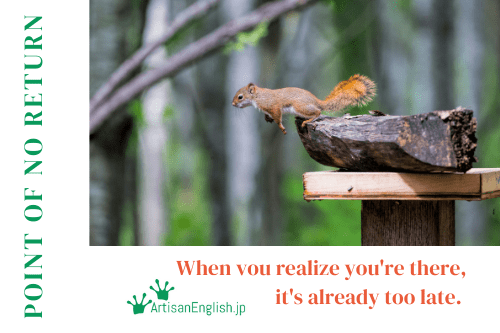
YouTube / iTunes / Spotify / Radio Public / Pocket Casts / Google Podcasts / Breaker / Overcast
Listen to ArtisanEnglish.jp posts & lesson intros here.
Phrase: Point of no return
Estimated reading time: 3 minutes
Any project you work on will progress to a certain point beyond which it is impossible to stop and when you cannot prevent or avoid its effects from taking place.
We call this the point of no return.
Climate change is one of the things affecting our lives that has already progressed beyond the point of no return.
Even if we try as hard as we can, we can only mitigate its effects so much.
The warming of the planet is not only inevitable; it is already occurring.
Today is April 1st, but the cherry blossoms have already bloomed around the country.
Heck, the best day to view them in Wakayama was last Saturday, March 27th.
I’m pretty sure when the new school year begins, the little kiddies will be walking under the beautiful green of young leaves with not a pink petal in sight.
If that isn’t climate change, I don’t know what is.
Another event that has passed the point of no return is the 2020 Tokyo Olympics.
Well, I suppose it depends on who you talk to about that.
According to the news reports, 80% of the Japanese public wants it cancelled outright or postponed again.
Perhaps the Winter and Summer Olympics could be held in the same year.
I’m pretty sure, though, that for the IOC, the JOC and the Japanese government, the point of no return for the Games was passed quite a long time ago.
It’s way too late to cut their losses and walk away now.
The only thing that can prevent the Olympics from happening is if the participants are no-shows.
Both climate change and the Olympics are man-made disasters for Japan, and both have passed the point of no return.
Flesch-Kincaid Readability Test
This post is understandable by someone with at least a 7th-grade education (age 12).
On the Flesch-Kincaid reading-ease test, this post scores 72.
The easier a passage is to read, the higher the score on a scale of 0 – 100.

